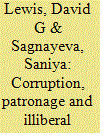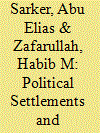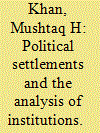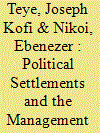| Srl | Item |
| 1 |
ID:
173907


|
|
|
|
|
| Summary/Abstract |
This article engages critically with recent literature on political settlements through a case study of inter-ethnic conflict in southern Kyrgyzstan. The case study traces how a new political settlement emerged in the aftermath of conflict, despite a rejection of international proposals on conflict resolution. Instead, local elites constructed an exclusionary form of social order, forged through dispossession and violence, maintained by informal institutions of patronage and clientage. The article explains why this new political settlement appeared remarkably resilient, despite its failure to address traditional liberal concerns regarding transitional justice and minority grievances. The case study highlights two major problems with the political settlements literature. First, it contests a widespread conceptualisation of political settlements as indicating a cessation of conflict, instead pointing to how a political settlement can be initiated and maintained through different forms of violence. Second, it questions notions of inclusivity in political settlements, noting that many political settlements combine logics of both inclusion and exclusion. In many cases, they are marked by exclusionary, authoritarian practices that together constitute a form of ‘illiberal peace’. These findings caution against a simplistic use of political settlements theory to inform policies aimed at resolving internal conflicts.
|
|
|
|
|
|
|
|
|
|
|
|
|
|
|
|
| 2 |
ID:
158292


|
|
|
|
|
| Summary/Abstract |
This article applies key insights from feminist institutionalist analysis to power-sharing and political settlement in postconflict societies. Drawing on the concept of “gender orders,” allied with considerations of the informal and highly masculine rituals and rules that pervade institutional political life, the article demonstrates how apparent gendered gains in power-sharing are limited in their transformative effect. Despite a greater emphasis on female inclusion, as mandated by United Nations Security Council Resolution 1325, women's capacity to shape postconflict politics in power-sharing is limited. These limitations are shaped not only by the complexity of postconflict political landscapes but by women's restricted access to closed informal spaces pivotal to the masculine functioning of power-sharing. The tendency to view women's contributions in highly essentialized and feminized ways undercuts and devalorizes women's political work in power-sharing institutions. Urging greater attention to the informal life of political institutions, the article exposes the multiple layers of exclusion for women in postconflict political engagement.
|
|
|
|
|
|
|
|
|
|
|
|
|
|
|
|
| 3 |
ID:
108117


|
|
|
|
|
| Publication |
2011.
|
| Summary/Abstract |
This article seeks to contribute to recent debates on the link between political settlements and state building. It proposes a theoretical framework that centres on the alternative concept of 'elite bargain' and suggests that inclusive elite bargains can be expected to facilitate both peace and economic development. Yet a detailed case study of elite bargains in Zambia shows that all good things do not always go together. While inclusive elite bargains have indeed helped to avoid civil war, they have often constrained economic development-a dilemma of unproductive peace.
|
|
|
|
|
|
|
|
|
|
|
|
|
|
|
|
| 4 |
ID:
173982


|
|
|
|
|
| Summary/Abstract |
This article attempts to analyse contemporary reforms of public bureaucracy in Bangladesh from the perspective of ‘political settlements’. After elaborating the concept of political settlement and identifying critical reform initiatives in the public bureaucracy, it argues that variations in the state of the implementation of bureaucratic reforms are decidedly affected by the differences in the pattern of political settlements that the nation has experienced at various times since independence. Thus, in the process of consolidating dominant power coalitions, reform measures were subverted, and formal and informal privileges given to the public bureaucracy resulted in inefficient, ineffective and unaccountable administration.
|
|
|
|
|
|
|
|
|
|
|
|
|
|
|
|
| 5 |
ID:
163398


|
|
|
|
|
| Summary/Abstract |
The political settlements framework argues that the distribution of organizational power is important for understanding the economic and political effects of institutions and policies. Institutions and policies describe rules that in turn determine resource allocation, and these can affect different types of organizations in very different ways. Organizations can be expected to support, resist or distort particular institutions or policies depending on their interests and capabilities. The distribution of organizational power can therefore determine the institutions and policies that are likely to persist as well as the ones most likely to be developmental in that context. This directs our attention to the importance of accurately identifying the relative power and capabilities of relevant organizations that describe a particular political settlement and how these may be changing over time. The articles in African Affairs that have used the political settlements framework demonstrate its usefulness. In this overview we examine the motivations behind the development of the framework and some of the challenges of applying it in the context of dynamic interactions between institutions and organizations. We also discuss the most appropriate definition of a political settlement, the questions the framework is most suited to answer and the challenges ahead for developing the framework and its applications.
|
|
|
|
|
|
|
|
|
|
|
|
|
|
|
|
| 6 |
ID:
193019


|
|
|
|
|
| Summary/Abstract |
This paper relies on literature review and primary data collected through in-depth interviews with 21 respondents to examine the political economy dynamics of the cocoa value chain in Ghana. The historical analysis, which was based on the political settlements framework, has shown that the policies implemented in the cocoa sector went through four periods. The colonial era was characterised by a fairly corporate governance system and struggle between European traders and farmer cooperatives for monopoly over internal marketing of cocoa. This was followed by the early post-independence era (1957–1980), which was characterised by neopatrimonialism and over-taxation of cocoa farmers. The third phase (1980–2000) witnessed economic reforms and liberalisation. The fourth phase (2000 to present) saw increased public–private partnerships aimed at empowering women and promoting environmentally friendly farming activities. The paper concludes that the policies in the cocoa sector have, historically, created more benefits (rents) to political elite and their crony capitalists. Given that rent-seeking behaviour is a threat to the sustainability of the cocoa sector, the paper urges international development partners and civil society groups to demand greater accountability and transparency from the political elite and state institutions in the cocoa sector.
|
|
|
|
|
|
|
|
|
|
|
|
|
|
|
|
| 7 |
ID:
163400


|
|
|